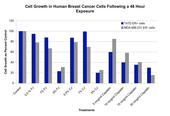Highlight
A potential nutritional intervention therapy for breast cancer
Achievement/Results
A NSF-funded researcher, Prof. Korinn Saker in the Department of Molecular and Biomedical Sciences at North Carolina State University and Virginia Tech MILES-IGERT trainee Dr. Amy Tanner, are investigating the use of pomegranate fruit as a natural source of antioxidants and a potential dietary therapy against human breast cancer. This study is important because breast cancer remains the most diagnosed cancer in North American women. More prevention and treatment options are needed. This study investigates the association between oxidative stress, pomegranate fruit antioxidant capacity and growth of human breast cancer cells through multidisciplinary efforts in food science, radical chemistry, cell biology and clinical nutrition. The researchers compared freshly prepared and commercially available pomegranate juice (FJ and CJ, respectively) to the chemotherapeutic drug, Cisplatin. Their tests have found that both fresh and commercial pomegranate juices have similar antioxidant activity. Additionally, breast cancer cells supplemented with FJ or CJ had significantly decreased growth after 48 hours (Figure 1) and 72 hours (Figure 2). This effect was comparable to cells exposed to Cisplatin. It is interesting to note that some of their results show that the cancer cells have increased oxidative stress. The relevance of this study is that the pomegranate fruit may function as either an antioxidant or pro-oxidant depending upon the cell type. As such, this fruit may have potential use as a less toxic alternative therapy compared to traditional chemo- or radiation therapies for human breast cancer.
Address Goals
Research indicates that pomegranate fruit extract (PFE) has potent antioxidant activity due to its polyphenolic components. This antioxidant activity has been shown to limit some disease conditions associated with oxidative stress such as breast cancer. Breast cancer is a leading cause of death in women worldwide. PFE represents an alternative treatment modality that provides a source of natural antioxidants and phytoestrogens. Understanding the mechanisms and antioxidant compounds found in certain foods such as PFE may help prevent certain cancers and may elucidate the potential health benefits of these foods. Promoting a healthy diet by consuming a diet rich in fruits loaded with antioxidants may be a therapeutic approach to help prevent the incidence of cancer or help ameliorate this disease condition. The overall objective of this study was to explore the potential relationship between the antioxidant capacity and anti-tumorigenic properties of PFE to better understand its value as a nutritional intervention therapy for human breast cancer.







